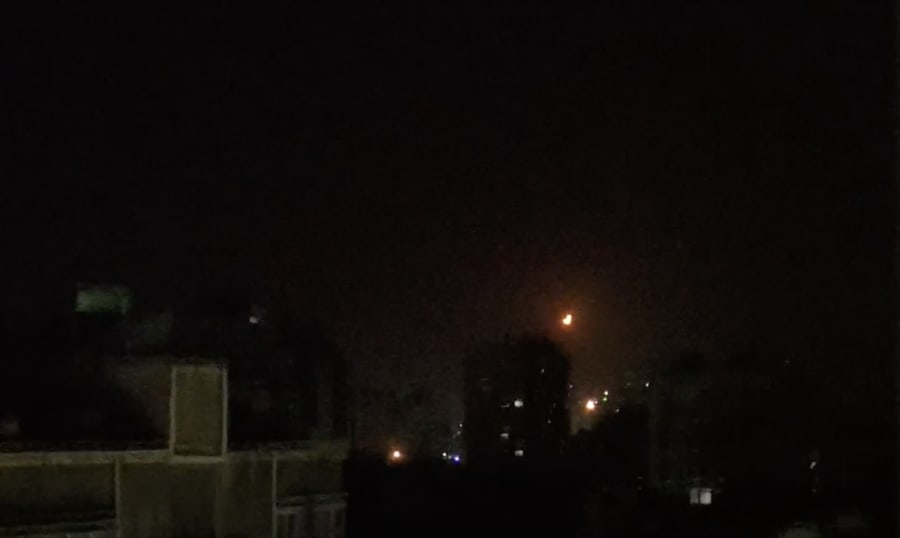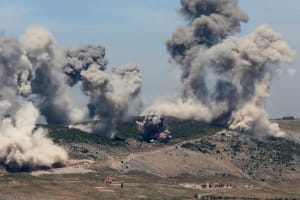Airstrike kills four Syrian soldiers outside Damascus amid deteriorating Russian-Israeli ties; Syria blames Israel
The Russian invasion of Ukraine has complicated a tacit status quo between Moscow and Jerusalem in Syria

Syria claims that four Syrian soldiers were killed and three wounded on Wednesday in alleged Israeli airstrikes on sites adjacent to the Syrian capital Damascus.
The missiles were fired from Israeli airspace towards the unspecified targets, the state news agency SANA reported.
“The Israeli enemy launched an aerial assault from the direction of northern Lebanon targeting a number of positions in the central region,” reported the SANA news agency, referring to an unnamed military source.
The source claimed that the Syrian regime had successfully intercepted the majority of the incoming Israeli missiles.
There were contradictory reports concerning the targeted sites. The Israel Air Force reportedly targeted two sites adjacent to Damascus International Airport, as well as a site affiliated with Iranian-backed militias in an area of Damascus, according to The Syrian Capital Voice. By contrast, the Lebanese Al-Mayadeen TV reported that the Israeli strikes targeted sites close to the Mezzeh Military Airport and other sites northwest of the Syrian capital.
This was the third such strike inside Syria during the past month.
The Jewish state normally does not comment on specific strikes inside Syria. However, Israel has confirmed it has conducted hundreds of strikes in recent years against largely Iranian and Iranian-affiliated targets across Syrian territory.
The overall purpose behind Israel's air strikes is to prevent the Iranian regime from establishing a threatening military front on the Jewish state’s northern border. However, on some occasions, Syrian soldiers have also been targeted when firing at the Israeli fighter jets. In addition, Israel has sent harsh warnings to President Bashar Assad not to affiliate itself with Iran.
While Assad is Syria’s president, and Iran has a significant presence in the country, Russia is today by far the most powerful player in Syria.
While Russian and Israeli interests are different, both Moscow and Jerusalem are interested in maintaining stability in Syria. In addition, Russia had expressed understanding for Israel’s strikes on Iranian military targets in Syria. With this tacit understanding, each side largely refrained from interfering in the other’s national interests inside Syria.
However, the Russian invasion of Ukraine in late February has complicated the already complex ties between Moscow and Jerusalem. For much of the war in Ukraine, Israel has attempted to keep a low profile and refrain from taking sides in the conflict. However, following increased pressure from the U.S. and other Western states, Israel has increasingly articulated its criticism of the Russian invasion of Ukraine. In early April, Israel supported a United Nations vote to suspend Russia from the UN Human Rights Council.
In addition, Israel’s Foreign Minister Yair Lapid explicitly accused Russia of committing war crimes in Ukraine.
“A large and powerful country has invaded a smaller neighbor without any justification. Once again, the ground is soaked with the blood of innocent civilians,” Lapid said. “The images and testimony from Ukraine are horrific. Russian forces committed war crimes against a defenseless civilian population. I strongly condemn these war crimes.”
Unsurprisingly, Russia was angered by Israel’s decision, especially by Lapid’s remarks, and accused Jerusalem of using the Ukraine conflict to cover up its own alleged human rights abuses in the Middle East.
Pressure has been growing on Jerusalem to provide military assistance to Ukraine. However, Russia’s Ambassador to Israel Anatoly Viktorov recently warned the Jewish state against providing defensive gear to Ukraine.
“We are carefully checking this information and will respond accordingly if it is confirmed,” Viktorov said.
Despite Russia's warnings, Israel decided this week to attend an American-led NATO defense summit for Ukraine. It is unclear how Israel’s participation in the pro-Ukrainian summit will affect future ties between Moscow and Jerusalem. Israeli Prime Minister Naftali Bennett has insisted that Israel will maintain its operational freedom in Syria.
However, Russia could potentially decide to retaliate by increasing its cooperation with Israel’s enemies, like Iran and Hezbollah. At the same time, it is unlikely that Russia wants to cut its ties with Jerusalem, nor does it seem to be in a position to prevent Israeli military operations against Iranian targets in Syria.
Moscow intervened in the Syrian civil war in 2015 in order to prevent the Assad regime from collapsing. To the disappointment of the West, this mission was largely accomplished, but the Russians have not been in a hurry to leave Syria. Russia maintains strategic military sites in Syria, including a Russian-controlled naval base in the Syrian port city Tartus. This base is crucial from a Russian perspective because it gives Moscow direct and permanent access to the Mediterranean Sea.

The All Israel News Staff is a team of journalists in Israel.













